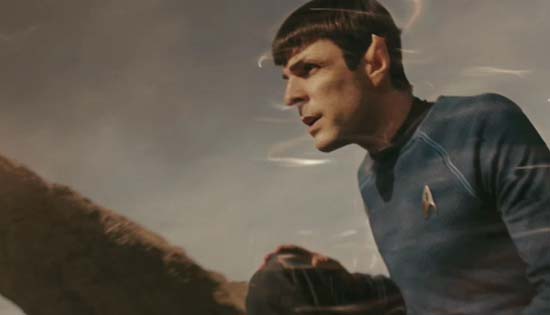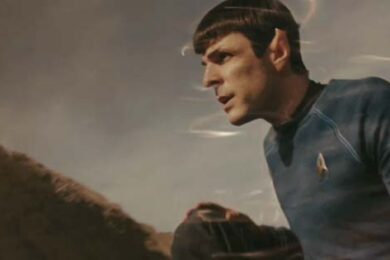They’ve been piping Star Trek out, in some form or other, since 1966. It’s old, but then it’s been old almost since it was born. The original series had a youthful exuberance, but the movies spawned through successive decades were either explicitly about or unintentionally reflective of an aging 60s cast keeping their heads above water. In 1994, the seventh movie passed the big screen torch to Patrick Stewart’s lot, whose TV characters were already household names from The Next Generation‘s plush re-invigoration of the franchise. Yet, once in cinemas, these characters aged with a ruthless rapidity. They stumbled as far as 2002’s Nemesis — an ill-advised attempt to create their own Wrath of Khan — and then pretty much lost the will to live.
Now director/producer JJ Abrams has reimagined (ie recasted) Star Trek in a bid to introduce a vitality that’s been missing for 40-odd years. His movie runs us at speed through the childhoods of icons James Tiberius Kirk and Spock, and warps its way through a convoluted coming of age scenario. It follows the maiden voyage of the USS Enterprise, some drastic rewiring of Trek lore (quite cleverly justified by a time travel plot — which, by its nature, has to be ridiculous), and what you’d imagine must be an extremely lucrative cameo and last laugh for one Leonard Nimoy. (Shatner, of course, ain’t around to do the ‘Space, the Final Frontier’ bit these days.)
As with Abrams’ other successes, Star Trek is a shrewd endeavour. A two-pronged manoeuvre is at work here: 1) Trekkies are a vociferous bunch, so he keeps them feeling secure with a nod or a wink every three seconds; 2) casual viewers find Trek’s self-referential preciousness irritating, so bold new lines are required — as a young Spock (Zachary Quinto) declares in the movie, "Our destinies have changed."
In some ways, what writers Alex Kurtzman and Roberto Orci present here is anything but a film filled with fresh ideas. We’re presented with a renegade Romulan villain in a monstrous spaceship, just as we were in the previous film, Nemesis. And Eric Bana’s character, Nero (wants vengeance; will destroy universe), isn’t much more than a miserable fulcrum around which the movie’s convoluted time travel elements operate.
Combine that with a script crammed with fan-aimed parodies and canonical in-jokes, and you might be left wondering how this film manages to keep any sense of its own identity whatsoever. It definitely does, though. Star Trek succeeds — for the first time in a while — in feeling like a film that will lead to further films (and indeed, two sequels are understood to be slated). Such thorough retreading of familiar turf is presumably an attempt to exorcise the ghosts of the franchise. The image that dominates the trailers — a childhood Kirk driving an antique car off a cliff — is apt.
Abrams is typically good with beginnings (not to mention hype campaigns) and Star Trek is no exception. In the opening scenes an uneven, seemingly disinterested camera roams the dissolving, panicked decks of the embattled USS Kelvin as if floating on the drifting radio chatter; the setting is archetypal, but the environment feels unfamiliar. It makes for a sequence that’s terse and dramatic in a way Star Trek hasn’t been for years, and establishes an outsider viewpoint that’s integral to the whole movie.
Then we get to what all the fuss has really been about — the cast. Over and above the Apple Store redesign of the Enterprise interiors, or the return of miniskirts and retro-future chic, the success of this reboot was really all about the appeal of the new crew. And you’ll hear no complaints on that front from this direction. Karl Urban is probably the most noteworthy doing his uncanny Dr McCoy; hearing Quinto make "live long and prosper" sound like it should be followed by "motherfucker!" was an unexpected pleasure; and, as Kirk, Chris Pine more or less nails his stated intention of doing ‘homage’ rather than impression — he acts the cocky, somewhat pompous smart-arse without trying to squeeze his lines into iambic pentameter. Simon Pegg adopts his usual strategy of playing Simon Pegg.
Outside of the Star Trek franchise, two comparisons spring to mind. The first is Joss Whedon’s Serenity (the Firefly movie) for the near-frantic urgency with which the narrative shifts from gear to gear (in Star Trek‘s case, with more than the occasional expositional creak). However, Whedon had desperately wanted closure for his prematurely ended franchise, whereas Abrams is trying to establish new beginnings for the one he’s inherited. The second is Paul Verhoeven’s Starship Troopers, for its coming-of-age component. With both, Abrams’s work shares an intoxicating light-heartedness (I would say ‘optimism’ but that would be problematic with Starship Troopers). While Whedon and Verhoeven’s films are to my mind superior, it’s refreshing to be able to compare Star Trek to them.
So — not a perfect movie, but you certainly get your money’s worth and the franchise is, at last, in a good place. But where it goes from here is anyone’s guess. Abrams’ projects arguably have their impetus in slick, intriguing lead-ins (think of Cloverfield, for instance) but leave us a bit cold once plot inertia takes over. Sulu (John Cho)’s instruction to engineering in the new Star Trek says it all: “One quarter impulse burst for five seconds. I’ll do the rest with thrusters.”
While we may have got some fresh faces and a brand new ship, ageing fast is endemic to the franchise. Star Trek’s utopian premise only heightens your awareness of its flaws. In a Next Generation episode, it’s explained that ‘poverty was eliminated on Earth, a long time ago. And a lot of other things have disappeared with it — hopelessness, despair, cruelty.’ Difficult to hang on to any sense of relevance when your characters are walking around twittering platitudes like that (so let’s hope that Abrams’s don’t start) — let alone the gymnastics involved in producing engaging stories that don’t entirely dispense with the format.
Nonetheless, despite its splutters, political spats, hiatuses, false starts and catastrophes, the behemoth that is Star Trek has a history of taking on all newcomers and somehow outliving them. Abrams’ people have defibrillated the thing out of this decade, and it looks like they’ll have at least a partial grip on the next one. The odds have been evened.
The Odds Will Be Even — The Odd-Numbered Star Trek films reassessed
Star Trek is technically the eleventh movie in the continuing series, or — using reboot logic — the first in a reimagined series. Either way, it’s an odd-numbered one. Odd-numbered Trek films have historically tended to be less successful than the even ones — a trend which has seen them written off as ‘the rubbish ones’ (for those with sympathy enough with the franchise to consider their even counterparts as being, on the whole, good). However, Star Trek’s success redresses this situation somewhat, and so arguably calls for a reappraisal of past failures.



